|
Limitar tu búsqueda
[+–] Editorial
[+–] Fecha
[+–] Formato
[+–] Idioma
[+–] Tipo de documento
[+–] Tipo de recurso
[+–] Classification
|

|
|
Protecting vulnerable children from uninsured risks: adapting conditional cash transfer programs to provide broader safety nets
Conditional cash transfer (CCT) programs have proved to be effective in inducing chronic poor households to invest in the human capital of their children while helping reduce poverty. They have also protected child human capital from the shocks that affect these households. In this paper, we argue that many non-poor households exposed to uninsured shocks have to use children as risk coping...
|
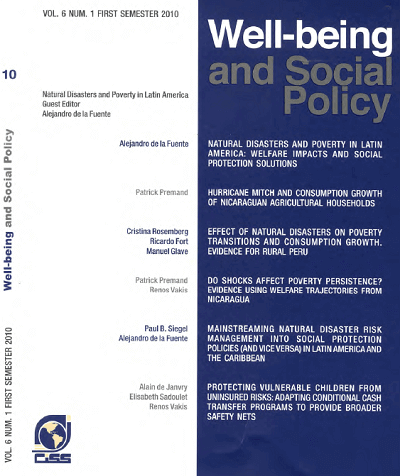
|
|
|
|

|
|
Employability and productivity among older workers: a policy frameworks and evidence from Latin America
As Latin American and the Caribbean countries face rapid aging transitions, the economic contribution of older workers would need to be strengthened. This paper uses household data from Brazil and Mexico to characterize labor market behavior of older workers, such as participation, sector and type of employment, and productivity, to identify critical areas for policy intervention. The paper also...
|
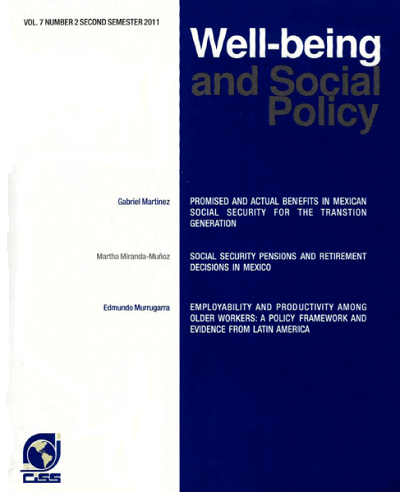
|
|
|
|

|
|
Mainstreaming natural disaster risk management into social protection policies (and vice versa) in Latina America and the Caribbean
This paper presents and applies the social risk management (SRM) conceptual framework to examine links between disaster risk, hazards, vulnerability, risk management, and social protection (SP). The paper makes the case that it is important to mainstream social protection policies into the disaster risk management (DRM) agenda and, vice versa as a means to improve household and community...
|
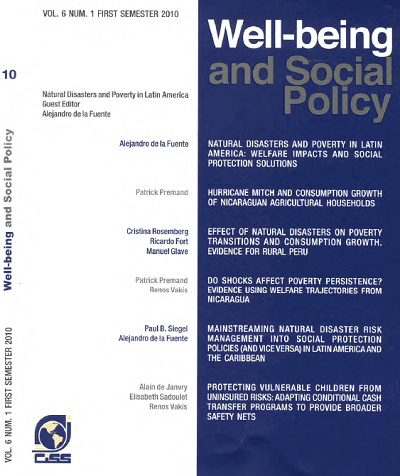
|
|
|
|

|
|
Do shocks affect poverty persistance? Evidence using welfare trajectories from Nicaragua
Shocks are often primarily associated with downward mobility or short-term movements in and out of poverty. However, households at the bottom of the welfare distribution are likely to face the most constraints to access insurance mechanisms. In this paper, we consider whether shocks directly affect poverty persistence. In order to analyze the impact of shocks on households’ welfare path over time...
|
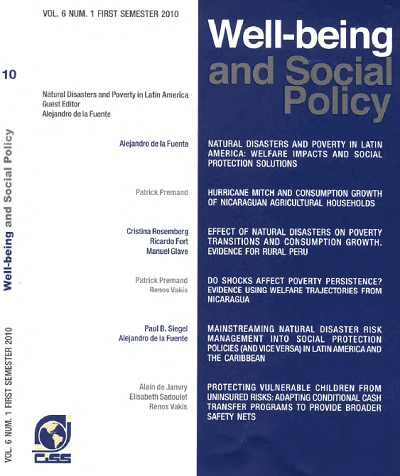
|
|
|
|

|
|
Effect of natural disasters on poverty transitions and consumption growth. Evidence for rural Peru
Natural hazards, an increasingly important phenomenon, have a direct impact at regional and household level. The growing incidence and persistence of natural events are strongly linked to increasing vulnerability of households and communities in developing countries. Previous socioeconomic vulnerabilities may exacerbate the impact of a specific event, making more difficult the process of...
|
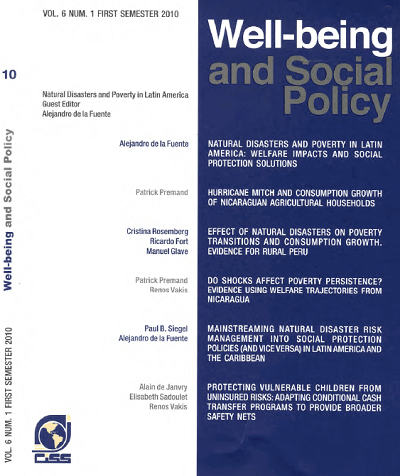
|
|
|
|

|
|
Hurricane Mitch and consumption growth of nicaraguan agricultural households
There is little micro-evidence on the persistence of natural disasters' welfare impacts. This paper assesses the effect of Hurricane Mitch on consumption of Nicaraguan agricultura) households. Mitch occurred in October 1998. Pre-post data is obtained from a nationally representative panel collected in 1998 and 2001. An additional survey was fielded in 1999 for households from the panel affected...
|
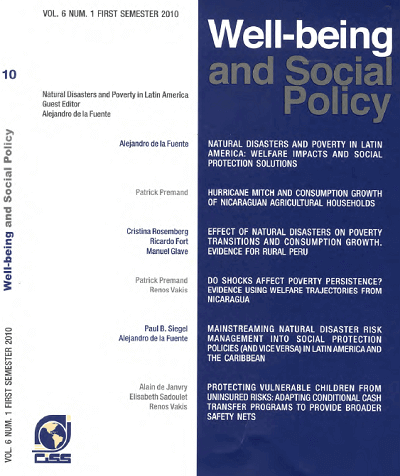
|
|
|
|

|
|
Natural disasters and poverty in Latin America: welfare impacts and social protection solutions
The Inter-American Conference on Social Security (CISS) and the United Nations Development Programme (UNDP) Office in Mexico jointly organized the conference “Natural Disasters in Latin America: Welfare Impacts and Social Protection Solutions” held in Mexico City in January 2010. The main objectives of the conference were to improve the understanding of (i) how natural disasters affect...
|
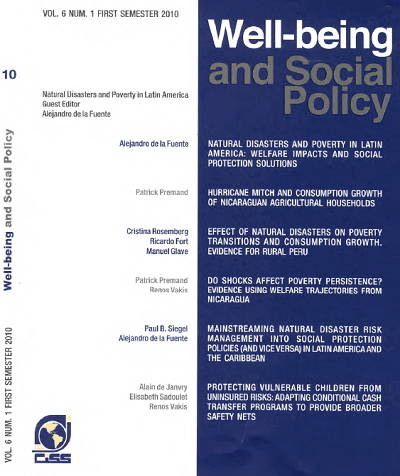
|
|
|
|

|
|
Book review. Informe de evaluación de la política de desarrollo social en México 2008, CONEVAL
The Evaluation Report on Social Development Policy in Mexico was published by the National Council for Social Development Policy Evaluation (CONEVAL) in 2008. The Council is one of the constituting elements of the new institutional framework to evaluate the public sector performance, particularly social development policies that were put in place mostly during the first decade of this century....
|
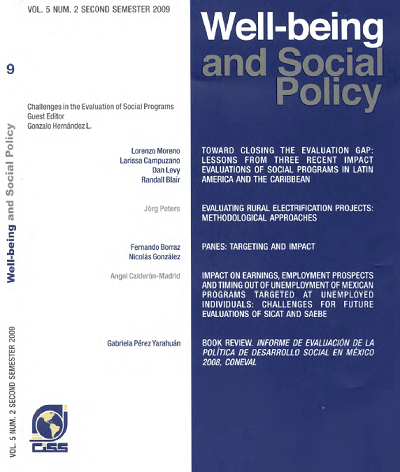
|
|
|
|

|
|
Impact on earning, employment prospects and timing out of unemployment of mexican programs targeted at unemployed individuals: challenges
his paper presents estimates of the impact of programs for unemployed workers on the performance of program beneficiaries in Mexico. We emphasize the significance of applying methodologies capable of avoiding statistical bias attributable to unobserved variables when measuring the impact on earnings and allowing to us properly estimate unemployment duration and work status after exiting from...
|
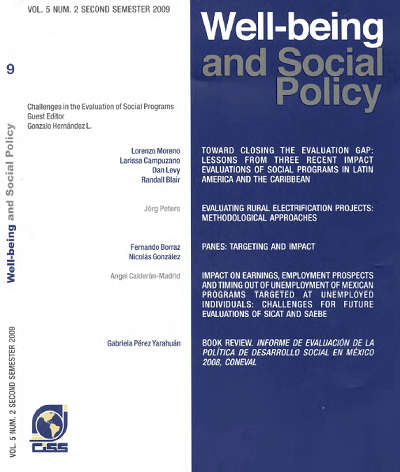
|
|
|
|

|
|
PANES: targeting and impact
This research paper intends to quantifit targeting performance in terms of the efficiency of the 1 National Plan for Social Emergency Assistance (PANES) implemented in Uruguay between 2005 and 2007 and determine its impact on relevant issues such as school attendance, child labor and the labor market. For this analysis , we used 2006 and 2007 Continual Household Survey (ECH) data.
Our outcomes...
|
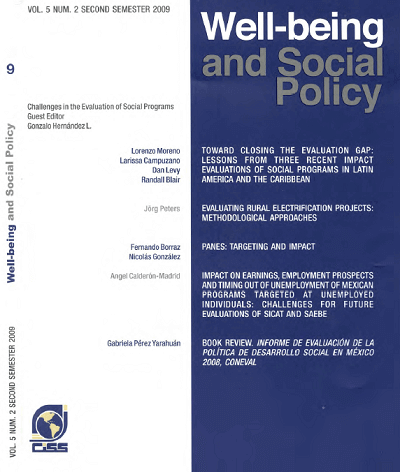
|
|
|
|

|
|
Evaluating rural electrification projects: methodological approaches
In recent years, the international community has expanded efforts in program evaluation to improve the accountability of development projects. This paper presents approaches to implementing state of the art evaluations in rural electrification projects, taking into account specific challenges that researchers face in such interventions. II suggests an approach to assess impacts before an...
|
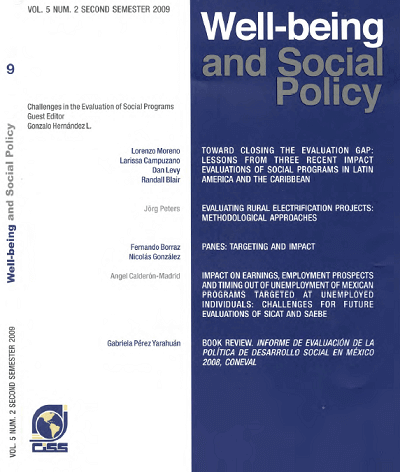
|
|
|
|

|
|
Toward closing the evaluation gap: lessons from three recent impact evaluations of social programs in Latin America and the Caribbean
Despite recent growing demand from funders and governments, rigorous impact evaluations in Latin America and the Caribbean remain the exception rather than the rule. Many commissioned impact evaluations are methodologically weak, and thus only marginally useful in assessing the impact of social interventions. Other impact evaluations feature strong research methodologies at their conception, but...
|
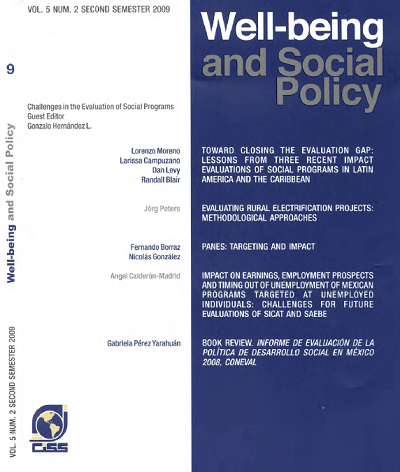
|
|
|
|

|
|
Social security pensions and retirement decisions in Mexico
Using Mexican cohort data for 1991-2000 this article examines the relationship between retirement decisions —the transition from work to labor market inactivity— and social security (contributive) pensions in less developed countries. The available large time series also makes possible to examine how a financial crisis that took place in 1995 has affected retirement incentives. In most Latin...
|
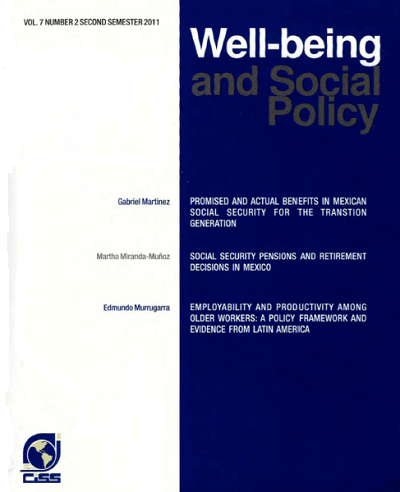
|
|
|
|

|
|
Socio-economic determinants and inequalities in childhood malnutrition in Sri Lanka
Despite countless initiatives to alleviate malnutrition over the years, it affects hundreds of thousands of children in Sri Lanka. Understanding the determinants of malnutrition and their contribution to socio-economic inequality in malnutrition is essential in targeting specific socio-economic groups to improve their nutrition levels. This study attempts to identify the socio-economic...
|
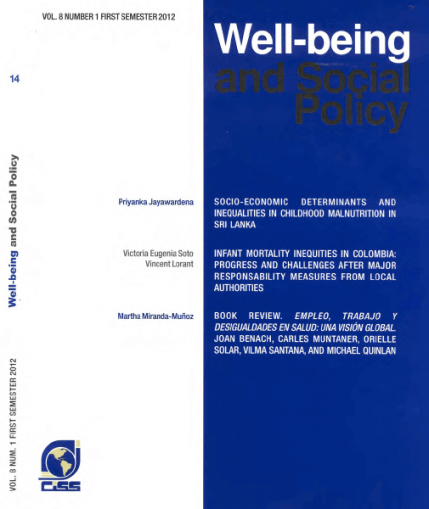
|
|
|
|

|
|
Ventajas y desventajas de la «libre elección médica»
Entendiendo por «libre elección médica» el derecho que las instituciones de seguro social, — más propiamente, de seguridad social —, reconocen a sus asegurados o afiliados de que puedan consultar a médicos particulares en lugar y fecha que a ellos más convenga y a cuenta de las mencionadas instituciones, las que han de pagar a nombre del paciente con base en tarifas prefijadas.
|
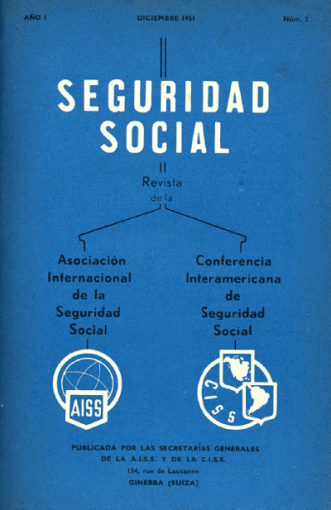
|
|
|
|

|
|
Do investments in public spaces generate social capital? Evidence for Mexico
The formation of social capital is critical for developing countries. This paper investigates the effects of attempts to recover public spaces in marginalized areas of Mexico. The effects are estimated through balancing in the propensity scores. We focus on the results of perception of safety, support and social capital. When efforts are made to recover public spaces, the perception of safety...
|
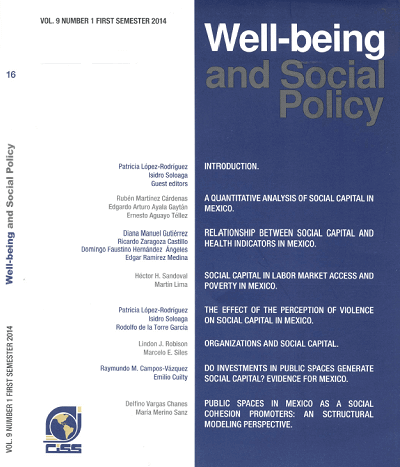
|
|
|
|

|
|
Una medida de previsión social en favor de los trabajadores migrantes
En este articulo se platena la creación de una organización internacional para la emigración intereuropea y extraeuropea, para prever los mejores medios de lograr una reglamentación sistemática y satisfactoria de las medidas de previsión capaces de garantizar a los emigrantes un régimen de pensiones — pensiones de vejez o pensiones de invalidez — que tome en consideración todos los períodos de...
|
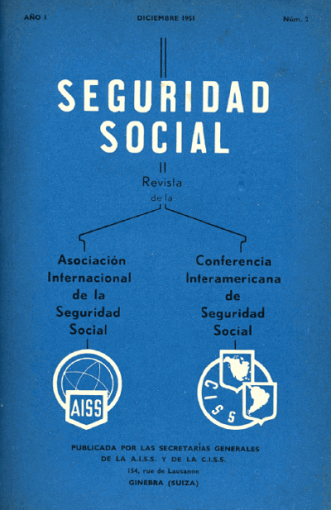
|
|
|
|

|
|
Orientaciones de la seguridad social en los países nórdicos
En el curso de su historia los cinco países nórdicos Dinamarca, Finlandia, Islandia, Noruega y Suecia se han mantenido en estrecho contacto, constituyendo, en determinados períodos, un solo Estado. Dinamarca, Noruega e Islandia, durante siglos, formaron parte del mismo Estado; igualmente Suecia y Finlandia constituyeron, hasta 1808, un solo Estado. Noruega, que en último lugar se había reunido a...
|
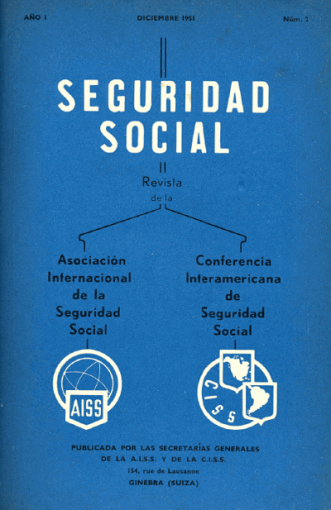
|
|
|
|

|
|
Las jornadas internacionales de estudios sobre fas prestaciones familiares
Atendiendo la invitación de la Unión Nacional de Cajas de Asignaciones
familiares, tuvieron lugar en París las Jornadas internacionales de estudios sobre las prestaciones familiares a las que asistieron 120 delegados de 22 nacionalidades, la mayoría de los cuales representaban bien a un gobierno, bien a un organismo de seguridad social, concurriendo otros a título personal.
El objeto de esas...
|
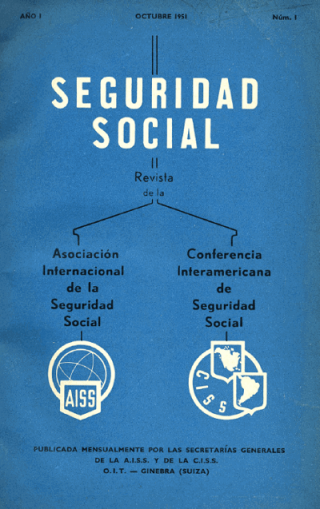
|
|
|
|

|
|
La asignaciones familiares
Texto sobre el régimen de asignaciones familiares de Francia en el que se trata de dar respuesta a las siguientes interrogantes:
¿Por qué motivo han pasado al plano de la actualidad las asignaciones familiares ?
¿ Cuáles son los problemas esenciales que se plantean?
¿ Qué soluciones se han aportado ya?
¿ Cuál es la situación actual de la cuestión ?
|
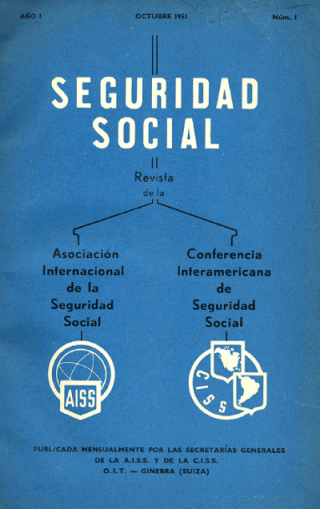
|
|
|
|
|